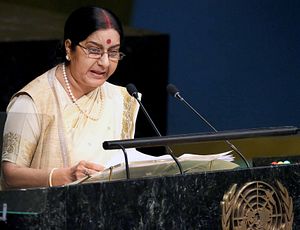Even as Prime Minister Narendra Modi was busy selling India like a master salesman in the United States, he found time to host the G4 summit with the leaders of Brazil, Germany, and Japan — the four countries that have taken the lead in for pressing for United Nations (UN) Security Council reforms. This summit was the first since 2004 and brought together Prime Minister Narendra Modi, German Chancellor Angela Merkel, Brazilian President Dilma Rousseff, and Japanese Prime Minister Shinzo Abe.
At the summit, Modi emphatically underscored that the UN Security Council “must include the world’s largest democracies, major locomotives of the global economy, and voices from all the major continents” to carry “greater credibility and legitimacy.” He said the four countries are ready to assume global responsibilities as he pressed for change, saying the world body reflects the mindset of a century “we left behind” and is not in tune with “new concerns” like terrorism and climate change. Having the four states in the Security Council, Modi argued would make the organization more representative and effective in addressing the challenges of the 21st century. In their joint statement too, the G4 leaders stressed that “a more representative, legitimate and effective Security Council is needed more than ever to address the global conflicts and crises, which had spiraled in recent years.” They strongly emphasized that the process underway in the UN to bring about the reform of the Security Council should be conducted, given its urgency, in a fixed time frame.
The G4 has made it clear that they want the reforms in Security Council membership to take place during this year. And from the way Modi has been canvassing with countries big and small for their support on UN reforms, he seems serious about investing significant political capital on this issue. Yet the reality remains that UN reforms will not be easy to come by. Even as the UN’s failures have become self-evident over the years, Indian political elites continue to view it as an almost indispensable actor in global politics that needs substantial Indian diplomatic investment. While this fascination with a moribund institution may not have had any cost in the past when India was on the periphery of global politics, a rising India of today cannot afford to cling on to that same old worldview. Yet India continues to expend its precious diplomatic capital on pursuing permanent membership in the Security Council.
India’s experience with the UN has historically been underwhelming, to put it mildly. Indian national interests have suffered whenever the nation has looked to the UN for support. As the Nehruvian idealism has gradually been replaced by a more confident assertion of Indian national interests, it is time for India to make a more forceful dissociation from the perfunctory modalities of the UN.
Too much of a UN-fixation is not good for the health of any nation, much less for a rising power like India. Indian interests today are global and ever-expanding. And the Indian government should have the self-confidence to declare that these interests will be protected and enhanced, irrespective of the priorities of other external actors. The Indian government is the only legitimate constitutional authority to decide when and how to use its instruments of power. And by and large there is only one criterion that it should use: preservation of vital Indian interests.
The UN is an international organization that was established in the aftermath of World War II and so reflects the distribution of power of that era. The Security Council, where the real power lies, has five permanent members with veto powers who use the organization to further their own interests. The General Assembly, for all its pretensions, remains a mere talking shop. The state of affairs in the UN is so pathetic that apart from some of its technical bodies, the rest of the organization is a farce. The UN Human Rights Council has had members like Sudan, Zimbabwe, China, and Saudi Arabia: all with stellar human rights credentials. No wonder Vaclav Havel called it “A Table for Tyrants”!
Indian leadership continues to give the impression that the role it sees for India in global security is not shaped by its own assessment of its interests and values, but by the judgements of global institutions like the UN. No major power takes UN Peacekeeping Operations seriously. Yet India continues to be one of the largest contributors to these peacekeeping contingents, sending nearly 180,000 peacekeepers to 44 missions over the years. Indian forces working for the UN have suffered more casualties than any other nation. Indian policymakers argue that this is being done not for any strategic gain but in the service of global ideals – “strengthening the world-body, and international peace and security.” Why should global peace and security be a priority for Indian government, a government that has continued to fail miserably in establishing domestic order and internal security?
There was always a calculation that being a leader in UN Peacekeeping would help India in its drive towards the permanent membership of the Security Council. But what has India achieved in reality? Despite its involvement in numerous peacekeeping operations in Africa for decades, the African states refused to support India’s candidature. Given China’s growing economic and military hold over Africa, the states in the region were merely pursuing their own interests. India’s candidature for permanent membership on the Security Council will be taken seriously only when India becomes an economic and military power of global reckoning, able to protect and enhance its interests unilaterally. Until then, Modi’s power diplomacy at the G4 will have little meaning.

































